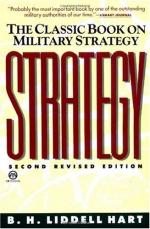
|
| Name: _________________________ | Period: ___________________ |
This test consists of 5 multiple choice questions, 5 short answer questions, and 10 short essay questions.
Multiple Choice Questions
1. Which of the following best defines military strategy?
(a) All movements and applications of military forces.
(b) The use of military forces in the field to destroy enemy forces.
(c) The combination of military and political means of warfare.
(d) The means by which military forces seek policy objectives.
2. What historical general is cited as basing his conquests on popular support?
(a) William of Normany.
(b) Belisarius.
(c) Caesar.
(d) Hannibal.
3. What should be the main purpose of any attack?
(a) Attacking enemy supplies.
(b) Destroying enemy forces.
(c) Dislocation.
(d) Psychological victory.
4. In World War II, what new branch of military technology provided enhanced mobility for soldiers?
(a) Flight.
(b) Landing craft.
(c) Transport ships.
(d) Mechanization.
5. According to the author, what type of government is least capable of creating ideal generals?
(a) Dictatorship.
(b) Fascism.
(c) Communism.
(d) Democracy.
Short Answer Questions
1. In the First World War, which Mediterranean nation did the allies hope to re-unify?
2. About how many soldiers did the Italians lose in their two and a half years of fighting in the First World War?
3. How did Hitler's military achievements match up against those of Napoleon's?
4. Which of the following was a factor in limiting the possibilities for strategy on the eastern front?
5. Communications are most critical for forces of what size?
Short Essay Questions
1. Describe the strategies used by the Turks during the First World War.
2. What is the principle of flexibility?
3. How does policy relate to national object and military aims?
4. What is the typical result of careless concentration of forces?
5. How did Hitler gain the loyalty and trust of his subordinates?
6. How does the nature and purpose of strategy relate to people's unwillingness to be convinced of a point contrary to their own beliefs?
7. How successful was Germany's expansion during the early parts of World War II? Why was this expansion eventually halted and reversed?
8. What were the results and casualty rates on the Southeastern and Mediterranean fronts during the First World War?
9. How did Hitler's study of Napoleon negatively influence him?
10. According to the author, what were some motivating factors behind writing this book?
|
This section contains 820 words (approx. 3 pages at 300 words per page) |

|




